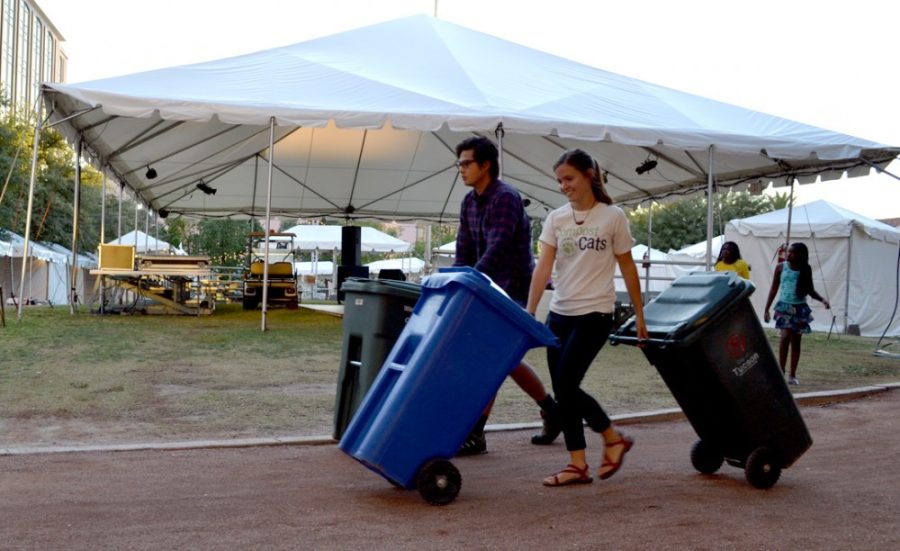Though the Tucson Meet Yourself festival showcases a number of beautiful pieces of art, the event wants you to be more conscious of your trash as you explore its festivities.
TMY is a folklife festival that acts as a platform for living traditions within Tucson’s various cultural communities. As stated by the TMY 2014 Festival information, available online, this year’s event boasts over 100 folk artists, including Tohono O’odham basket weavers and painters, Turkish ceramics and calligraphy, Pascua Yaqui Deer Dance musicians, Dine rug weaving and bead work and many other exciting and informative artistic cultural representatives.
According to Maribel Alvarez, TMY’s executive program director and an associate professor in the School of Anthropology, the festival has a more complex flavor than just its cultural art.
“For many people, we are known in a funny way as Tucson Eat Yourself,” Alvarez said.
With about 52 food vendors from diverse cultural backgrounds — like the Daughters of Penelope, a Greek vendor, and Wat Buddhametta, a Thai vendor — TMY has a variety of foods to offer its visitors.
As one of Southern Arizona’s largest festivals, TMY recognizes its need to minimize the amount of waste it creates and sends to landfills.
According to the city of Tucson’s environmental services manager, Francis LaSala, TMY has tried to recycle in the past with unsuccessful results.
“Several years ago, we were providing recycling to the [TMY] Festival,” LaSala said. “The type of contamination that was present in the recycling caused me to pull recycling from the event.”
While the news was unfortunate for future TMY festivals and for the state of the environment, that decision didn’t fly with Associated Students of the University of Arizona subsidiary groups Compost Cats and Students for Sustainability.
In 2013, CC and SFS approached members of TMY to establish a collaborative partnership that not only facilitates a successful recycling experience at the festival but also incorporates a composting facet.
The Green Team is a student and volunteer-based program created and implemented by students at the UA that helps assist festivalgoers at TMY in navigating which waste goes where. Each team consists of 48 members that oversee 24 green stations, waste disposal stations that include recycling, composting and landfill-designated containers.
CC and SFS then partnered with the city’s environmental services, which supplies materials that assist in the delivery and collection of recycling and composting and are vital for Green Teams to do their jobs.
“We can haul and they can compost, so we’re both playing our strengths,” LaSala said.
While the process of coaching people on how to throw away their trash might seem tedious to some just looking to drop their trash and head back to the festival’s alluring activities, the Green Team ends up diverting a nominal amount of food waste, which, when looked at from a different perspective, becomes a large problem.
“The city of Tucson did a waste audit suggesting that 80 percent of everything in our local landfills can be either composted or recycled,” said Chester Phillips, ASUA sustainability coordinator and Compost Cats project director.
“Nationally, it’s estimated that 40 percent of the food grown and imported never makes it to anyone’s plate before it ends up in a landfill,” Phillips said.
Phillips’ sources at the Rio Rico Landfill, north of Nogales, Ariz., recently informed him that they receive up to 700 pounds of food every month that is still edible.
This problem becomes even more haunting when Arizona’s rank in national childhood food insecurity comes into play.
“The state of Arizona is the third worst in the nation for childhood food insecurity,” Phillips said. “We have about 30 percent of our kids that, at some point in the last year, didn’t know where their food was going to come from.”
While those numbers may seem daunting, CC and SFS look at the situation as a project that needs attention.
Last year, according to Phillips, CC and SFS helped divert 880 pounds of food waste and 3,450 pounds of recycable material from being dumped in Tucson landfills just by implementing their Green Team strategy at the TMY festival.
“We see it as an enormous educational opportunity,” Phillips said.
Solely by providing information to the general public on how to properly dispose of waste at the most effective locations, CC and SFS were able to make TMY one of Southern Arizona’s most environmentally friendly festivals.
This year, Phillips is expecting between 1,200 and 1,400 pounds of food waste from his newly polished program, which has been upgraded from last year’s program model that covered only some of the stations present at the festival. According to Phillips, the new program will not only employ Green Team staff members at every green station, but will also eliminate all other free standing trash receptacles, which will increase the overall efficiency of the collaborative effort to reduce waste.
“It makes sense in many ways that we would be involved in recycling food waste and making sure that it gets back to the same land that TMY honors in the first place,” Alvarez said. “Without CC/SFS — the bodies, the know-how, the expertise, the total ability to coordinate — none of that would be possible.”
_______________
Follow Ian Martella on Twitter.









